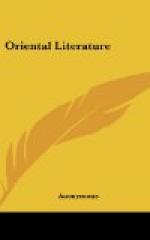[35] Written to a lady upon her refusal of a present
of melons, and her
rejection of the addresses
of an admirer.
THE CAPTURE OF JERUSALEM[36]
From our distended eyeballs flow
A mingled stream of tears
and blood;
No care we feel, nor wish to know,
But who shall pour the largest
flood.
But what defense can tears afford?
What aid supply in this dread
hour?
When kindled by the sparkling sword
War’s raging flames
the land devour.
No more let sleep’s seductive charms
Upon your torpid souls be
shed:
A crash like this, such dire alarms,
Might burst the slumbers of
the dead.
Think where your dear companions lie—
Survey their fate, and hear
their woes—
How some thro’ trackless deserts
fly,
Some in the vulture’s
maw repose;
While some more wretched still, must bear
The tauntings of a Christian’s
tongue—
Hear this—and blush ye not
to wear
The silken robe of peace so
long?
Remember what ensanguin’d showers
The Syrian plains with crimson
dyed,
And think how many blooming flowers
In Syrian forts their beauties
hide.
Arabian youths! In such a cause
Can ye the voice of glory
slight?
Warriors of Persia! Can ye pause,
Or fear to mingle in the fight?
If neither piety nor shame
Your breasts can warm, your
souls can move,
Let emulation’s bursting flame
Wake you to vengeance and
to love.
Almodhafer Alabiwerdy.
[36] The capture of Jerusalem took place in the 492d
year of the Hegira,
A.D. 1099. Alabiwerdy,
who wrote these verses, was a native of
Khorasan; he died A.H.
507.
TO A LADY
No, Abla, no—when Selim tells
Of many an unknown grace that dwells
In Abla’s
face and mien,
When he describes the sense refin’d,
That lights thine eye and fills thy mind,
By thee alone
unseen.
Tis not that drunk with love he sees
Ideal charms, which only please
Thro’ passion’s
partial veil,
’Tis not that flattery’s glozing
tongue
Hath basely fram’d an idle song,
But truth that
breath’d the tale.
Thine eyes unaided ne’er could trace
Each opening charm, each varied grace,
That round thy
person plays;
Some must remain conceal’d from
thee,
For Selim’s watchful eye to see,
For Selim’s
tongue to praise.
One polish’d mirror can declare
That eye so bright, that face so fair,
That cheek which
shames the rose;
But how thy mantle waves behind,
How float thy tresses on the wind,
Another only shows.
AN EPIGRAM[37]




